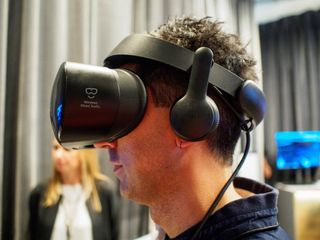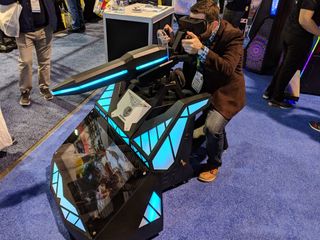The arcade may be the foothold Windows Mixed Reality needs
The VR hype train feels like it has died down a bit, but that doesn't mean Microsoft is done.

For a couple of years, it felt like VR was going to become an inescapable part of gaming life, but as we move into 2019, it certainly feels as though the hype has fallen by the wayside. In any case, Microsoft isn't done.
The company is widely expected to be unveiling HoloLens 2 at Mobile World Congress this year, and has seen a surge in orders among enterprises who are finding unique uses for augmented reality, particularly in medicine and engineering. The US military just dropped half a billion dollars on HoloLens orders, in a move that could see even bigger investments down the line.
Microsoft's cheap-and-cheerful range of Windows Mixed Reality headsets are also finding a foothold as a cheaper alternative to competing VR headsets, with on-board tracking proving to be a simpler set-up scenario than some other products out there.
At CES 2019, we saw a few examples of Windows Mixed Reality finding popularity as a modern arcade machine solution, granting opportunities for the location-based entertainment sector.
Arcade of the future

As a kid, you might've used arcade machines to kill time while waited for a movie in the cinema, but going further back they often represented unique experiences simply not available in the home. House of the Dead was a particularly memorable rail shooter in my own experience, sporting visuals simply not possible on home consoles at the time, complete with futuristic-feeling light guns that were far more accurate than some of the solutions designed to be used at home.
Tech has some a hell of a long way since then, of course, but VR still feels like it's too overly complex and prohibitively expensive for the casual user, particularly when it comes to Windows-based VR, which requires powerful hardware and boatloads of cables to go with it. Simply put, VR is very much for enthusiasts right now, and probably still far away from hitting the mainstream in the short term. That being said, location-based entertainment solutions might go some way to bridging the gap between the enthusiast and mass market consumer, where all the set-up is already done.
Source: VRLOUSA
Get the Windows Central Newsletter
All the latest news, reviews, and guides for Windows and Xbox diehards.
One such solution we saw at CES 2019 was VRLEOUSA's Scorpion deck, which incorporates a Windows Mixed Reality headset into a sit down VR experience, blasting aliens on a gun-turret. As far as the user is concerned, there's no set-up required on their end. Simply sit down and play.
Microsoft Technical Fellow for Mixed Reality Alex Kipman noted to us that Redmond is indeed seeing an uptick in location-based entertainment companies seeking to utilize Windows Mixed Reality headsets in particular, citing the best-in-class specs on the new Samsung Odyssey+ headset, and the comparatively low up-front costs when compared to headsets that require external sensors for tracking. Amusement parks, arcades, cafes, shopping centers, and other types of businesses are all seeking WMR kiosks to offer something unique to their customers.
Companies like Varonia Systems (above) are experimenting with large-scale events based on Windows Mixed Reality too, offering arena-style shooter combat and unique peripherals that incorporate the Windows Mixed Reality joysticks. Today, Varonia Systems relies on Windows backpack PCs to power its games, but manufacturers are already exploring full standalone headset experiences where a bulky PC wouldn't necessarily be required for a quality experience.
What does the future look like?
While it looks like HoloLens may find its future in business and enterprise, Microsoft seems to be doubling down on the possibilities of WMR in the consumer space. Mainstream adoption probably won't be until they can truly make these headsets cable free with the software support of a platform like Xbox, but in the near-term, they continue to be a great, cost-effective solution for enthusiasts looking to dabble in SteamVR.
For regular consumers however, their first experiences of VR might be on a whim while in an edgy coffee shop, or while waiting in a movie theatre. Chances are, those headsets will be Windows Mixed Reality-based, for as long as Microsoft and its partners remain aggressive on price options. This fact bodes well for future support, in an era where no consumer-oriented Microsoft product feels safe from the chopping block. Here's hoping they stick with it.

Jez Corden is a Managing Editor at Windows Central, focusing primarily on all things Xbox and gaming. Jez is known for breaking exclusive news and analysis as relates to the Microsoft ecosystem while being powered by tea. Follow on Twitter @JezCorden and listen to his XB2 Podcast, all about, you guessed it, Xbox!
